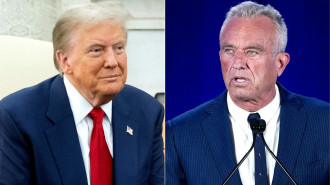Israel protesters keep up the pressure on Netanyahu over judicial overhaul
Israeli demonstrators crowded Tel Aviv late Saturday for another protest against Prime Minister Benjamin Netanyahu's plans to overhaul the judiciary, despite the process being put on hold.
Organisers said around 258,000 people attended, but Israeli police gave no figures of their own.
The demonstration came a day after a car-ramming attack on the city's seafront killed an Italian visitor and injured seven other tourists.
Violence has surged since Israeli police stormed Al-Aqsa mosque in Jerusalem on Wednesday and attacked worshippers.
Israel bombarded both Gaza and Lebanon, saying this was in response to rocket fire by Palestinian fighters.
Protesters on Saturday brandished signs reading "Save democracy!", "Freedom for all!" and "Netanyahu is leading us to war".
In Tel Aviv, protests against PM Netanyahu and his coalition government continue for the 14th weekend. Take a look:pic.twitter.com/wGLiMZpMec
— Steve Hanke (@steve_hanke) April 9, 2023
Let my people go
— Josh Drill (@drill_josh) April 8, 2023
The Umbrella Movement unfurls a banner showing Pharaoh (from the Jewish holiday of Passover), with the words “Let my people go,” in central Tel Aviv to kick off 14th week of protests.
Photo Credit: Or Adar pic.twitter.com/4Ik7FHnDEF
Other, smaller, demonstrations took place in the central city of Kfar Saba, at Haifa in the north and in Jerusalem.
Thousands of protesters, sometimes tens of thousands, have been taking to the streets each week since the overhaul plans were announced in January by Netanyahu's government, which was formed in December.
On March 27, he announced a "pause" to allow for dialogue on the reforms which were moving through parliament and split the nation.
Netanyahu last month had announced the firing of his defence minister, Yoav Gallant, who cited a threat to national security because "the growing social rift" had made its way into the army and security agencies.
The proposed overhaul would curtail the authority of the Supreme Court and give politicians greater powers over the selection of judges.
Opponents have raised fears for Israel's "democracy" but the government, a coalition between Netanyahu's Likud party and extreme-right and ultra-Orthodox Jewish allies, argues the changes are needed to rebalance powers between lawmakers and the judiciary.
Israel's attorney general had warned Netanyahu, just prior to the pause, against any intervention in changes to the judicial system because of conflicts of interest. The prime minister is on trial over charges of bribery, fraud and breach of trust, which he denies.







 Follow the Middle East's top stories in English at The New Arab on Google News
Follow the Middle East's top stories in English at The New Arab on Google News
![The new film casts Israeli actors to tell the story of Mary while leaving out Palestinians [Getty]](/sites/default/files/styles/image_330x185/public/2024-11/GettyImages-2172155541.jpg?h=199d8c1f&itok=wJWyXDEQ)
![Ben & Jerry's has taken Unilever to court for its alleged attempts to silence it [Getty]](/sites/default/files/styles/image_330x185/public/2024-11/GettyImages-2183900214.jpg?h=199d8c1f&itok=jEcYtQ64)
